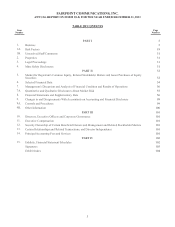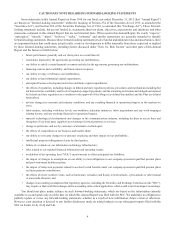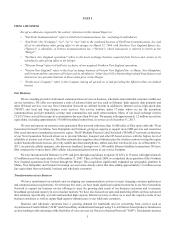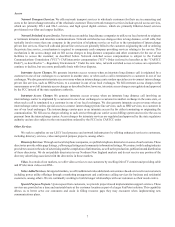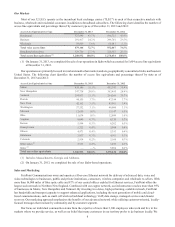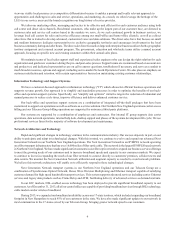FairPoint Communications 2013 Annual Report Download - page 15
Download and view the complete annual report
Please find page 15 of the 2013 FairPoint Communications annual report below. You can navigate through the pages in the report by either clicking on the pages listed below, or by using the keyword search tool below to find specific information within the annual report.13
The FCC's CAF/ICC Order (as defined herein and sometimes referred to in the industry as the "Transformation Order")
modified regulation for us beginning January 1, 2012. Effective January 1, 2012, the FCC eliminated the rural/non-rural distinction
among ILECs and treats ILECs as either price cap or rate-of-return. Under the new rules, effective January 1, 2012, all of our
ILECs are treated as price cap companies for CAF purposes, including the Telecom Group rate-of-return companies. However,
the Telecom Group rate-of-return companies continue to be treated as rate-of-return for regulation of interstate switched and special
access services. In addition, the FCC has preempted certain state regulation over our ILECs, including capping all state originating
and terminating switched access charges and reducing terminating state switched access charges beginning July 1, 2012, in a two-
year transition to make state switched access charges equal to interstate switched access charges. Following this two-year transition
and starting July 1, 2014, all terminating usage rates will transition to zero over the following four to seven years.
Overview of FCC CAF/ICC Order to Reform Universal Service and Intercarrier Compensation
On March 16, 2010, the FCC submitted the National Broadband Plan ("NBP") to the United States Congress. The NBP is a
plan to bring high-speed Internet services to the entire country, including remote and high-cost areas. In accordance with the NBP,
the FCC commenced several rulemakings that concern, among other things, reforming high-cost and low-income programs to
promote universal service to make those funds more efficient while promoting broadband communications in areas that otherwise
would be unserved and to address changes to interstate access charges and other forms of ICC.
On November 18, 2011, the FCC released its comprehensive landmark order to modify the nationwide system of universal
support and the ICC system (the "CAF/ICC Order"). In this order, the FCC replaced all existing USF for price cap carriers with
its CAF. The intent of CAF is to bring high-speed affordable broadband services to all Americans. The CAF/ICC Order
fundamentally reforms the ICC process that governs how communications companies bill one another for exchanging traffic,
gradually phasing down these charges.
In conjunction with the CAF/ICC Order, the FCC adopted a Notice of Proposed Rulemaking to deal with related matters,
including but not limited to: (i) the actual cost model to be adopted for CAF Phase II funding, (ii) treatment of originating access
charges, (iii) modifications to CAF for rate-of-return ILECs, (iv) development of CAF Phase II for mobility, (v) CAF Phase II
reverse auction rules, (vi) remote areas funding and (vii) IP to IP interconnection issues. It is not known what decisions will be
made on these issues or how they may impact us. In general, CAF Phase I is interim support provided to price cap carriers during
the period in which the FCC establishes its permanent CAF funding rules for CAF Phase II. CAF Phase I includes certain support
structures, including frozen support and optional incremental support. CAF Phase I will continue until CAF Phase II is implemented,
which is dependent on how long it takes the FCC to complete its CAF Phase II proceedings.
CAF Phase I and Phase II Support. Pursuant to the CAF/ICC Order, beginning in 2012, we started receiving monthly CAF
Phase I frozen support, which is based on and equal to all forms of USF high-cost support we received during 2011. This support
is considered transitional funding while the FCC is developing its CAF Phase II program. FCC rules require that if we continue
receiving CAF Phase I frozen support beyond 2012, which we have, we will have specific broadband spending obligations starting
in 2013. According to the FCC rules, in 2013, we were required to spend, and did spend, one-third of the frozen support to "build
and operate broadband-capable networks used to offer the provider's own retail broadband service in areas substantially unserved
by an unsubsidized competitor." We anticipate receiving CAF Phase I frozen support in 2014 and, if we do so, our spend obligation
will increase to two-thirds. Should we continue to receive CAF Phase I frozen support in 2015 as well, this spend obligation will
increase to 100%. In February of 2013, we filed a petition with the FCC for a partial waiver of the spending obligations. On
October 30, 2013, the FCC issued an order denying FairPoint's petition, but clarifying the spending rules in a manner that effectively
provides the relief we requested by allowing us to certify to the spending obligation at the holding company level.
In addition, pursuant to the revised CAF programs, during 2012, we were offered $4.8 million of one-time funding under
the FCC's CAF Phase I incremental support program. Under this program, we can use some or all of this support subject to certain
restrictions. We notified the FCC that we accepted $2.0 million of CAF Phase I incremental support funding, which is primarily
being used in Vermont. On September 10, 2012, we filed a petition with the FCC asking it to waive its rules to allow us to use the
remaining $2.8 million of CAF Phase I incremental support funding to bring high-speed broadband services to 697 customer
locations in the state of Maine. This petition was withdrawn on August 27, 2013 in response to the FCC making the unused 2012
funding available in the second round of support offered in the 2013 CAF program. On May 22, 2013, the FCC filed the Report
and Order in WC Docket 10-90, which offered the second round of support under the FCC's CAF Phase I incremental support
program. We were offered $4.8 million, with the opportunity to oversubscribe to the funding. Additional funding was available
in this program to the extent other price cap carriers declined their full amount and because the FCC made an additional $185.0
million available to price cap carriers for this round of support. On August 20, 2013, we applied for $3.3 million from the FCC's
CAF Phase I incremental support program and were awarded only $2.9 million due to challenges filed against some of the locations
by competing carriers.


